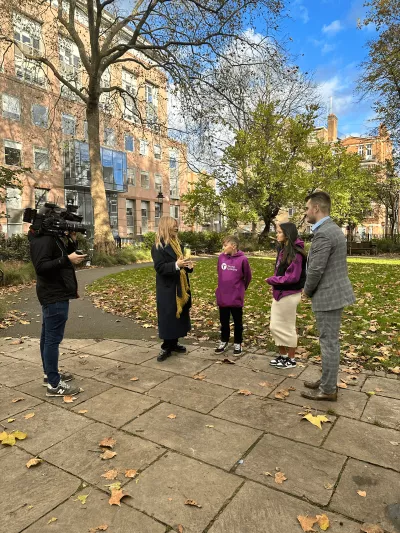Mum of three, Kelly has more experience than most of supporting children with epilepsy as both her son Cash, 11, and daughter Darla, 9, have been diagnosed with focal epilepsy. Cash is one of the faces of our #UnderstandMyEpilepsy campaign and has been living with epilepsy since he was just six years old.
When Edith met Cash
Cash shared his disappointment with Edith about being excluded from a football camp during the Easter holidays. The organisers had a blanket restriction that prevented anyone with epilepsy from participating, leaving aspiring footballer Cash side-lined while his friends enjoyed the camp.
Edith was so touched by Cash’s story that she arranged for tickets for him and his sister, Darla, to watch their favourite team, Manchester United, play at the legendary Old Trafford Stadium.
For National Epilepsy Week 2024, Young Epilepsy brings you an Instagram Live session where Edith talks to Kelly discussed about the challenges they experience as a family and how they navigate life with childhood epilepsy.

Edith's Personal Connection to Epilepsy
Edith has her own personal connection to epilepsy having experienced seizures from a very young age until her early teens. Her personal history has fuelled her commitment to raising awareness and supporting epilepsy-related causes, including her involvement with Young Epilepsy.
Kelly's Story: Cash's Struggle with Epilepsy
Kelly shared a detailed account of Cash's ongoing struggle with epilepsy. Diagnosed five years ago, Cash has endured focal seizures for seven years now and has tried nearly 14 different treatments, including anti-seizure medications, the ketogenic diet, and a supplement called K.Vita. Despite these efforts, Cash continues to experience uncontrolled seizures.
After a brief period of hope when Cash had a month of being seizure-free, the seizures have soon returned. Kelly talks about the critical need for more effective treatments, noting that many children with epilepsy face drug-resistant forms of the condition, leaving families feeling stuck and helpless.

And a lot of other parents who have children with epilepsy will say it's kind of like making a cocktail. You're just kind of trial and error and you never know what's going to work. The issue is obviously there's a lot of NHS waiting time.Kelly, Cash's mum
The Struggles with Healthcare and Treatment
One of the most significant challenges the family has faced is the long NHS waiting times and the fragmented care system. Cash is on a waiting list for a surgical evaluation to determine if brain surgery could help manage his seizures. However, they've been waiting nearly three years for a crucial video telemetry procedure, which has been cancelled five times due to staffing pressures and other issues. This delay not only impacts Cash’s potential treatment but also adds immense stress to the family.
Kelly described the trial-and-error nature of epilepsy treatment as "like making a cocktail," highlighting the lack of clear information for families about the treatment pathway. Despite having a dedicated epilepsy team and specialists from multiple hospitals, the inconsistent and delayed access to necessary procedures makes managing Cash's condition incredibly challenging.
The Social Stigma and Its Impact
Beyond the medical challenges, Kelly addressed the social stigma associated with epilepsy. Cash often faces injustice, even at school and during recreational activities. Having missed 43 days of school last year due to his condition, they family found there is little provision for catching up on missed education. Teachers and peers often misunderstand epilepsy, particularly focal seizures, leading to situations where Cash is unfairly treated or excluded.
This only reinforces the need for better education and awareness about epilepsy among the general public.
Moving Forward: Raising Awareness and Support
Kelly and Edith stressed the importance of ongoing conversations about epilepsy to break down stigmas and push for better support and treatment options. Kelly highlighted our petition fighting to ensure that every child with epilepsy receives the necessary support at school. The petition is a step toward addressing the broader systemic issues affecting children with epilepsy.


